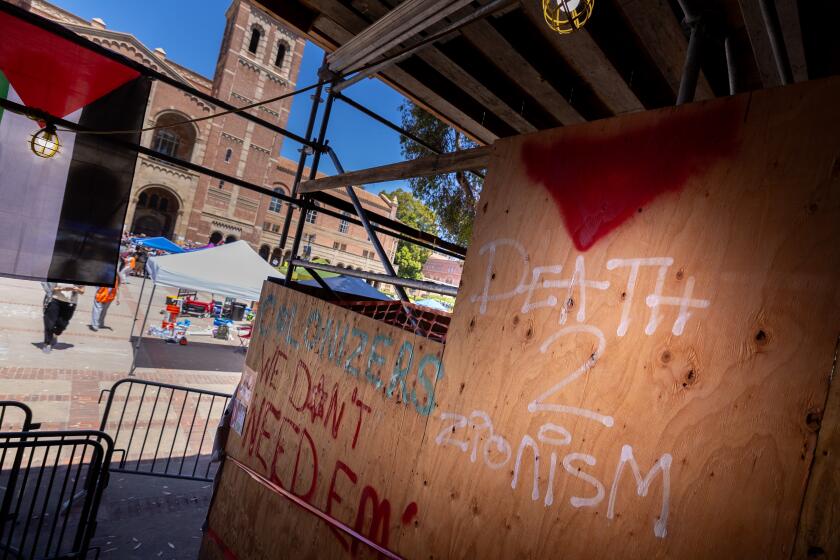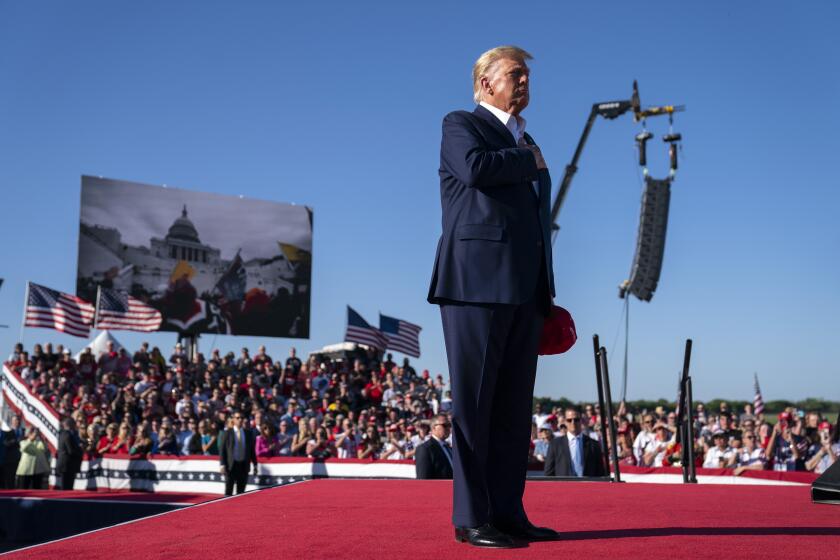Chieftains Wary About Peacekeepers
What passes for the law in this military outpost just north of Kabul is a ragtag band of teenagers whose authority emanates from the Kalashnikov rifles they wield with more bravado than skill.
Like other Northern Alliance soldiers-turned-policemen in much of this country, the troops here have yet to learn how much of their clout with local villagers and Taliban captives may erode as the first of thousands of foreign peacekeepers begin arriving this weekend.
An international force to secure Kabul, the capital, and its outskirts is part of the ambitious peace plan negotiated in Germany this month that will install an interim government Saturday. The incoming administration is made up mostly of alliance warlords whose regional power struggles have kept Afghanistan at war for the last two decades.
It is precisely this threat to the status of local chieftains that has delayed the final details of the peacekeeping force and the U.N. mandate it needs to function effectively.
Abdul Majid is in charge of the 60 men and boys who loiter in a warren of abandoned shops and parched courtyards here that serves as police precinct, defense outpost and temporary jail.
“We are the soldiers of Haji Abdul Qayum,” Majid, one of the few local protectors old enough to shave, said of the warlord who controls this village and a nearby checkpoint on the road to Kabul. “If he tells us we will be replaced by foreign forces, we will honor that. But it is his decision, not Kabul’s.”
Such private armies wield power throughout Afghanistan, and although most commanders have pledged cooperation with the interim government, the integration of the foreign peacekeepers could be fraught with regional resistance if militia bosses try to flex their muscle.
With only three days left before the interim government takes over from the alliance forces who overran Kabul on Nov. 13, Afghanistan’s de facto authorities were still squabbling Wednesday about the number and mandate of the foreign peacekeepers.
Prime Minister-designate Hamid Karzai assured European leaders during a visit to Rome that the new government is agreeable to the deployment of 3,000 to 5,000 troops to take over some police functions and provide security for the fledgling attempt at civilian rule.
But even Karzai said the final decision will be up to incoming Defense Minister Mohammed Qassim Fahim, who has insisted that no more than 1,000 foreign troops are needed--and solely to protect government facilities where the 30-member Cabinet will be working.
Afghanistan’s acting foreign minister, Abdullah, has also frustrated a final agreement by informing the U.N. Security Council by letter this week that the foreign troops should have limited powers of enforcement and stay in Kabul for just three months.
In London, British Defense Minister Geoff Hoon told Parliament on Wednesday that Britain will lead the peacekeeping force for three months, after which another as-yet-unnamed country will take over.
Prime Minister Tony Blair confirmed that British peacekeepers will not be in Afghanistan for long.
“Our troops are not there on a long-term basis. We believe they will be there for several months,” Blair said. “It is important that they are there at the outset in order to make sure that the new provisional government in Kabul can operate effectively.
“It is vital for us to bolster the political agreement that has been reached with a security assistance force. . . . It’s very much in the interests of this country that we increase the prospects of a stable future in Afghanistan.”
Western diplomats who have begun straggling back to the abandoned Afghan capital in recent days say the eleventh-hour haggling over the force is mostly bluster to appease those local warlords still reluctant to give up their power.
“The Afghan authorities have said they may accept 5,000 troops,” said one diplomat at the British mission in Kabul, drawing a distinction between what is being said in public and what alliance leaders are agreeing to on the quiet.
Britain to Lead International Force
Britain has been taking the lead in negotiating the force details because it has agreed to head the mission and contribute the largest contingent. As many as 1,500 British troops will be made available.
The troops being deployed to Kabul will be authorized by a U.N. mandate, but they will neither wear the traditional blue helmets of U.N. peacekeepers nor answer to a chain of command established by the world body. Instead, contributing nations will place their troops under British Maj. Gen. John McColl for a mission yet to be defined by the incoming Afghan leaders.
Some concern has been expressed about coordination between the security force, in which the United States will play no significant role, and the U.S. troops in southern Afghanistan trying to eradicate terrorist holdouts loyal to Osama bin Laden.
But the U.S. special envoy to Afghanistan, James Dobbins, dismissed those concerns, saying Washington is eager to see its allies take on the responsibility of keeping the peace in Kabul so that Afghans can begin the long work of rebuilding the capital.
With no central authority since the Taliban was overthrown and those policemen who are still on the job unpaid for months, thefts and assaults are rampant in Kabul but rarely reported. And after more than two decades of civil war and shifting alliances, weapons are in the hands of virtually all men and boys, who are quick to use them to underscore a point.
Disarmament Issues Still Unresolved
Who will have to disarm and what will be done with the weapons are among the questions still to be settled. The main contributors to the peacekeeping force--including Germany, Italy and France--say those details can be negotiated only after the new government is in office.
The first 200 British Royal Marines are expected to arrive before Saturday’s inauguration. Most of them will come from a base at the former Soviet airfield in Bagram, just north of Kabul, where for weeks they have been awaiting orders that will give them a role in the international coalition’s war on terrorism.
The bulk of the force, however, is unlikely to be in place before mid-January.
One task likely to fall to the peacekeepers is handling the Taliban prisoners who are in the custody of the regional militias that captured them.
At Majid’s barracks-cum-prison, eight Taliban captives have been idling in a small courtyard since alliance forces swept through here en route to Kabul. Six of them are believed to be Pakistani.
The captives offered none of the fiery rhetoric of the Taliban. Docile, listless and unsure of their fate, the men said they have no fear of consequences for their anti-alliance actions. In fact, they appeared confused about what they were fighting against when they were captured.
“We wanted only to bring security to Afghanistan. If this happens with the foreign forces and they do not try to take power here, then we will be satisfied,” said Abdul Khaleq, a 22-year-old who said he came to the capital two months ago in a futile bid to stave off the Taliban’s ouster.
Said 27-year-old Mohammed Omar, from the Pakistani border region near Quetta: “If the foreign troops let us go home, we will know they are no threat to the future of Afghanistan.”
*
Times staff writer Marjorie Miller in London contributed to this report.
More to Read
Start your day right
Sign up for Essential California for news, features and recommendations from the L.A. Times and beyond in your inbox six days a week.
You may occasionally receive promotional content from the Los Angeles Times.







